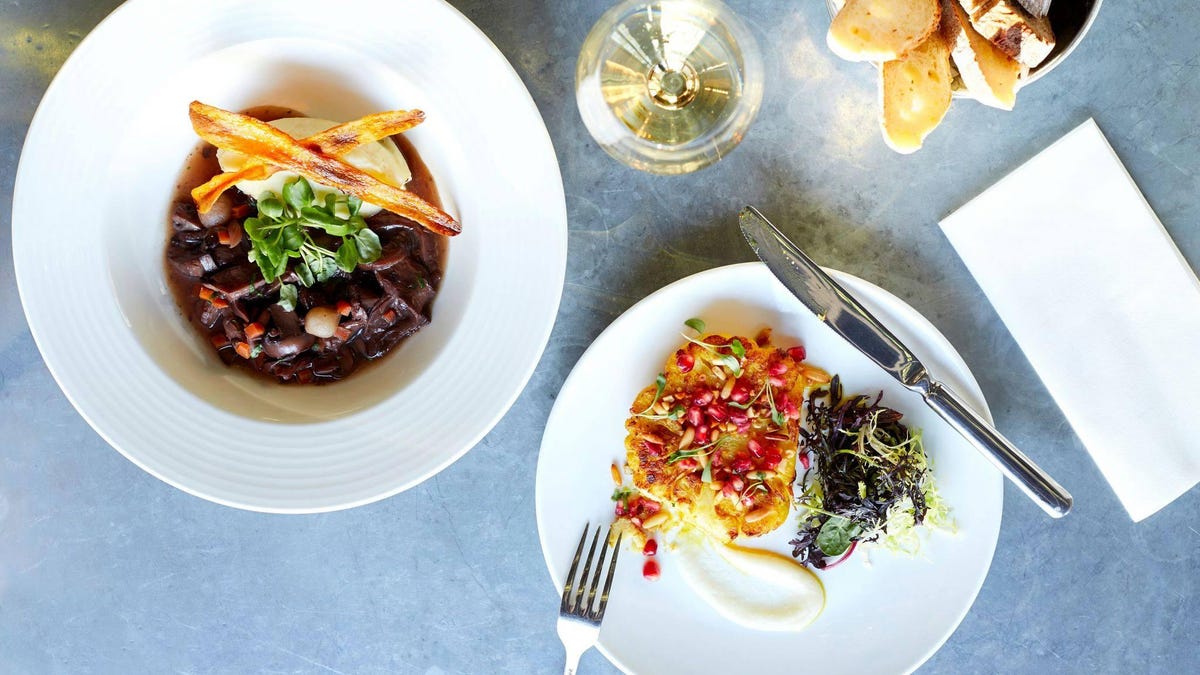Eat on the cheap and save the planet with this dining app
Waste not, want not with Karma, an app that lets you buy Michelin-starred leftovers to help reduce global food waste.

I'm still in the office at 7:25 p.m., but I'm feeling pumped. If I leave right now, I can get down to my local sushi joint and buy up the remaining salmon sashimi for less than half what it costs at lunchtime, and before all the other local bargain hunters get to it.
My sushi joint is just one of many stores and cafes across London that would rather sell off their excess stock for the day for pennies than throw it in the bin. But even then, there's no guarantee it'll have leftovers at closing time. There's also no guarantee for me, the hungry customer, that it will have any of those duck rolls remaining that I like so much.
Enter Karma, a dining app that launched in London on Thursday. It matches up restaurants with food they need to get rid of and canny consumers like me who will jump at the chance to bag themselves a cheap meal. Restaurants list surplus food on the app for less than half its original price. Consumers then purchase it from within the app and drop in to pick it up.
Read more: The best meal-kit delivery services
For customers, Karma eliminates the issue of speculatively popping your head around the door in the hope there's something on offer that day. This also opens the door to all kinds of establishments selling their otherwise unsold food. But apps like Karma do more than help sate the hunger of thrifty office workers and save restaurants money -- they're out to help save the planet by eliminating food waste, too.
Apps can help users integrate practices into their daily lives.
While hunger remains one of the biggest challenges the world faces, we are also wrestling with the problem of excess food. Figures from the UN's Food and Agriculture Organization estimate that one third of all food -- 1.3 billion tons per year -- produced globally is thrown away rather than eaten. And world hunger isn't the only problem exacerbated by food waste. That excess also contributes to 8 percent of global greenhouse gas emissions, according to British recycling charity Wrap.
"We all need to unite in the food waste fight to address this, at home, at work, and in the shops, stores and places where we eat and drink," a Wrap spokeswoman said in an email.
Karma is one of a bunch of apps aiming to tackle this problem by redistributing waste that would otherwise end up in the garbage. The group includes Olio, which lets users list and sell on surplus food they have at home, and FoodLoop, which sends out push notifications to users when their local supermarkets list reductions. Others like FoodCloud and Food Cowboy focus on linking up food providers with charities.
Wrap's "Love Food Hate Waste" campaign, meanwhile, is trying to get people to use up products they might otherwise throw away at home, in the same way that Karma is trying to get people to buy up food that would be binned in restaurants.
"Everyone has a role to play," Elsa Bernadotte, one of Karma's four co-founders, said in an interview.
Supply and demand
In Sweden, where Karma is based, the app boasts 250,000 active users. Many restaurants are excited by the prospect, said Bernadotte, because they deal with super-strict margins. Signing up allows them to save money while also appearing more socially conscious. New customers couldn't hurt, either.
Karma has 1,000 partners on board in Sweden, where the app launched in November 2016, and already has 50 different outlets signed up for its expansion to London. But there are also some restaurants out there that are more hesitant about joining.
"No one wants to admit they're part of the problem," said Bernadotte.
Some restaurateurs can legitimately claim that they don't have a problem with waste, but they're few and far between. Dan Barber of Michelin-starred Blue Hill in New York, for example, famously builds his cooking around reducing waste in the food chain. Similarly, Doug McMaster, who runs restaurant Silo in Brighton in the south of England and last September opened an experimental restaurant and cocktail bar called Cub in East London, works with the aim of having nothing left over when he's finished in the kitchen for the day. But this style of cooking is far from widespread.
Other restaurants take a while to win over. But perhaps the biggest compliment of all, said Bernadotte, "is that we've never had anyone leave the platform."
Karma has 50 London outlets onboard at launch.
For its London launch, Karma has partnered with Michelin-starred Aquavit, French bistro group Aubaine and healthy fast-food chains like Hummus Bros and Detox Kitchen.
Hani Nakkach, founder of Aubaine, said in a statement that he was pleased to be working with Karma to tackle the problem of food waste within the industry. "Its success is its simplicity, which creates a win-win situation for everyone involved while preserving the environment," he said.
The US is one market Bernadotte says she's "definitely" interested in, adding only that Karma's looking to launch its next market by the end of the year.
Americans lead the way in food waste, throwing away almost 50 percent of what they produce, according to a Guardian report published in 2016.
"It scares me," Bernadotte said. "If we weren't interested in the US, we would be stupid, because our end goal is to reduce food waste on a global scale."
The Smartest Stuff: Innovators are thinking up new ways to make you, and the things around you, smarter.
Blockchain Decoded: CNET looks at the tech powering bitcoin -- and soon, too, a myriad of services that will change your life.

